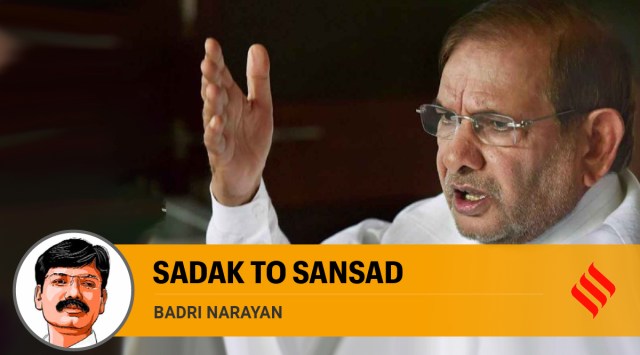
In one of his couplets, Kabir said, “Kabira aise jayiye, aap hanse jag roye” (O Kabir, our final departure should be such that we laugh and the world cries). Many of Sharad Yadav’s colleagues could not hold back their tears on hearing of his demise. Prime Minister Narendra Modi said he will always remember the meetings and friendly conversations with Sharadji.
Sharad Yadav was a voice of several marginal communities and a symbol of subaltern assertion. No one can forget his contribution towards the implementation of the Mandal Commission report which changed the paradigm of politics in India, especially the northern part of the country.
Sharadji’s ideas of social justice were drawn from Rammanohar Lohia and Babasaheb Ambedkar. As an ideologue of Lohiaite politics, he not only promoted social justice as an ideology but also made significant contributions to the politics evolving around it. In doing so, contributed a lot in strengthening the politics of Lalu Prasad and Nitish Kumar in Bihar, who he realised would take forward the politics of social justice in India. In the Eighties and the beginning of the Nineties, we would hear a lot of conversations, in public places and on trains, in which Sharadji was referred to as the Chanakya of the political forces helmed by Lalu Prasad and Nitish Kumar. He played a key role in the formation of parties like the Rashtriya Janata Dal and JD(U) and was one of the architects of the Grand Alliance formed after the 2015 assembly elections in Bihar. Sharad Yadav was a minister in the Atal Bihari Vajpayee government in the late Nineties as well as the VP Singh government in 1989. In 2018, he launched the Loktantrik Janata Dal, which he merged with the RJD two years later. He was a vocal voice of the Opposition for a long time.
Sharad Yadav started his political career as a student leader in Madhya Pradesh and became popular during the JP movement, along with Lalu Prasad, Nitish Kumar, Arun Jaitley, Shivanand Tiwari, Ashwini Kumar Choubey and many others. He became an all-India face against the tyranny of the Emergency.
His politics had an all-India resonance. That is why Sharadji could win elections to Parliament from constituencies in Madhya Pradesh, Uttar Pradesh and Bihar. He was also a three-time Rajya Sabha MP. He was popular in the southern states and had close relations with socialist leaders, mobilisers and activists in Karnataka, Andhra Pradesh and Tamil Nadu. He was always supportive of the struggles of peasants, labourers and other marginal groups. His political journey, in fact, comprised various kinds of protest movements — student agitations, peasants struggle led by socialist groups, the JP movement and various political assertions for social justice. He was a politician who emerged from the sadak (street) and reached the Sansad.
Sharadji belongs to the generation of politicians who believed in dialogue. That’s why he earned a lot of friends across party and ideological lines. He was one of the true democrats in Indian politics. At the same time, he would always keep a critical eye on politics, especially socialist politics which was so dear to him. That, perhaps, is why there were ups and downs in his relations with contemporaries like Lalu Prasad and Nitish Kumar.
As one of the strong proponents of social justice politics, Sharadji always tried to critically evaluate the process of implementing social justice measures. He was aware that in any form of politics, one needs to think about the people at the margins. He attempted to focus the politics of his time towards the last man of society. His politics had more to do with ideology and less with pragmatism.
Because he was a politician of convictions, he lost many friends during the last days of his life. Despite his deep understanding of politics, he may have failed to understand that politics, after all, is a domain of pragmatism. Ideas and morals get new forms with changing times.
The writer is professor, Govind Ballabh Pant Social Science Institute, Allahabad
Blurb: His politics had an all-India resonance. That is why Sharadji could win elections to Parliament from constituencies in Madhya Pradesh, Uttar Pradesh and Bihar. He was also a three-time Rajya Sabha MP. He was popular in the southern states and had close relations with socialist leaders, mobilisers and activists in Karnataka, Andhra Pradesh and Tamil Nadu. He was always supportive of the struggles of peasants, labourers and other marginal groups. His political journey, in fact, comprised various kinds of protest movements — student agitations, peasants struggle led by socialist groups, the JP movement and various political assertions for social justice. He was a politician who emerged from the sadak (street) and reached the Sansad.